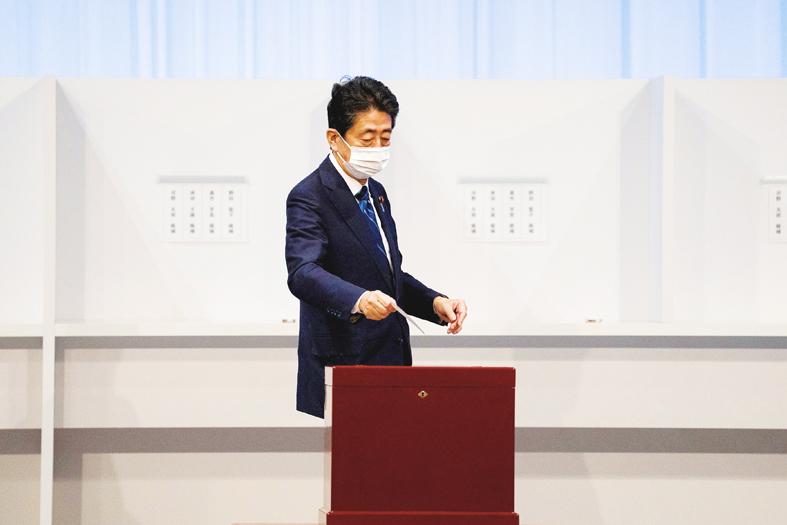China has reacted angrily to a call by former Japanese prime minister Shinzo Abe for Tokyo to consider hosting US nuclear weapons in the wake of Russia’s invasion of Ukraine and rising concern over Chinese aggression toward Taiwan.
Abe, who presided over record defense budgets before resigning in 2020, said Japan should cast off taboos surrounding its possession of nuclear weapons following the outbreak of war in Europe.
“In NATO, Germany, Belgium, the Netherlands and Italy take part in nuclear sharing, hosting American nuclear weapons,” Abe said in a TV interview, Nikkei Asia reported. “We need to understand how security is maintained around the world and not consider it taboo to have an open discussion. We should firmly consider various options when we talk about how we can protect Japan and the lives of its people in this reality.”

Photo: Reuters
Japan, the only nation to have been attacked with nuclear weapons, in Hiroshima and Nagasaki, is part of the US nuclear umbrella, but has for decades adhered to three non-nuclear principles — that it will not produce or possess nuclear weapons or allow them on its territory.
Japanese Prime Minister Fumio Kishida quickly rejected Abe’s call for a debate on the nuclear-sharing option.
“It is unacceptable given our country’s stance of maintaining the three non-nuclear principles,” Kishida, who represents a constituency in Hiroshima, told lawmakers this week.
“Japanese politicians have frequently spread fallacies related to Taiwan and even blatantly made false remarks that violate the nation’s three non-nuclear principles,” Chinese Ministry of Foreign Affairs spokesman Wang Wenbin (汪文斌) told reporters in Beijing.
“We strongly ask Japan to deeply reflect on its history,” Wang said, adding that Tokyo should “be cautious in words and deeds on the Taiwan issue to stop provoking trouble.”
Abe, a conservative whose lifelong political ambition is to revise Japan’s “pacifist” constitution, said any conflict involving China and Taiwan would also constitute an emergency for Japan.
He called on the US to end its “ambiguity” on the defense of Taiwan, noting that it is just 110km from Yonaguni, Japan’s westernmost inhabited island.
“The US takes a strategy of ambiguity, meaning it may or may not intervene militarily if Taiwan is attacked,” Abe said. “By showing it may intervene, it keeps China in check, but by leaving open the possibility that it may not intervene, it makes sure that the Taiwanese forces for independence do not get out of control.”
Abe, leader of the biggest faction in Kishida’s ruling Liberal Democratic Party, has made several hawkish interventions on security policy that enjoy support inside the party, but could provoke a backlash among voters nervous about Japan’s potential involvement in regional conflicts.
China’s state-run Global Times accused Abe of attempting to “unlock” Japanese militarism.
“It is not only ironic, but also a huge real risk, that a group of people in the only country in the world that was bombed by atomic bombs would call for an invitation to the culprit to deploy nuclear weapons in their own territory,” it said in an editorial.

Right-wing political scientist Laura Fernandez on Sunday won Costa Rica’s presidential election by a landslide, after promising to crack down on rising violence linked to the cocaine trade. Fernandez’s nearest rival, economist Alvaro Ramos, conceded defeat as results showed the ruling party far exceeding the threshold of 40 percent needed to avoid a runoff. With 94 percent of polling stations counted, the political heir of outgoing Costa Rican President Rodrigo Chaves had captured 48.3 percent of the vote compared with Ramos’ 33.4 percent, the Supreme Electoral Tribunal said. As soon as the first results were announced, members of Fernandez’s Sovereign People’s Party

MORE RESPONSIBILITY: Draftees would be expected to fight alongside professional soldiers, likely requiring the transformation of some training brigades into combat units The armed forces are to start incorporating new conscripts into combined arms brigades this year to enhance combat readiness, the Executive Yuan’s latest policy report said. The new policy would affect Taiwanese men entering the military for their compulsory service, which was extended to one year under reforms by then-president Tsai Ing-wen (蔡英文) in 2022. The conscripts would be trained to operate machine guns, uncrewed aerial vehicles, anti-tank guided missile launchers and Stinger air defense systems, the report said, adding that the basic training would be lengthened to eight weeks. After basic training, conscripts would be sorted into infantry battalions that would take

GROWING AMBITIONS: The scale and tempo of the operations show that the Strait has become the core theater for China to expand its security interests, the report said Chinese military aircraft incursions around Taiwan have surged nearly 15-fold over the past five years, according to a report released yesterday by the Democratic Progressive Party’s (DPP) Department of China Affairs. Sorties in the Taiwan Strait were previously irregular, totaling 380 in 2020, but have since evolved into routine operations, the report showed. “This demonstrates that the Taiwan Strait has become both the starting point and testing ground for Beijing’s expansionist ambitions,” it said. Driven by military expansionism, China is systematically pursuing actions aimed at altering the regional “status quo,” the department said, adding that Taiwan represents the most critical link in China’s

‘REALLY PROUD’: Nvidia would not be possible without Taiwan, Huang said, adding that TSMC would be increasing its capacity by 100 percent Nvidia Corp CEO Jensen Huang (黃仁勳) on Saturday praised and lightly cajoled his major Taiwanese suppliers to produce more to help power strong demand for artificial intelligence (AI), capping a visit to the country of his birth, where he has been mobbed by adoring fans at every step. Speaking at an impromptu press conference in the rain outside a Taipei restaurant, where he had hosted suppliers for a “trillion-dollar dinner,” named after the market capitalization of those firms attending, Huang said this would be another good year for business. “TSMC needs to work very hard this year because I need a lot